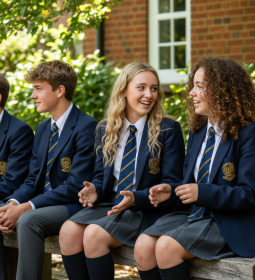"Before the trip" guide to a foreign school, a language or sports camp
Usually, in order to have a comfortable and pleasant trip abroad, we take the most necessary staff, count the days before the flight, carefully collect the suitcase and check on the checklist.
What should you bring on your study abroad trip? How to figure out what to bring, what to leave and what is actually essential?SMAPSE experts present you study abroad packing list items neccessary for a child.
ATTENTION : if a child has unsufficient language proficiency, it is recommended to get some preparation with a tutor first.
Documents
- Foreign passport with valid visa
- The document on enrollment in the school (camp), with the indicated contacts, emergency telephone
- Instruction of the school "Before the trip" (English Pre-arrival form) - not found in all institutions
- Confirmation of transfer
- Insurance. No insurance? To issue an insurance policy (the link represents the generator of all insurance companies, where you can choose the best option for the price)
- Air tickets. SMAPSE experts strongly recommend to print out your flight tickets to not mix up the dates and time of flights.
TOP-24 study abroad packing list items
- a smartphone for communication, it can also be needed for some tasks in the classroom
- one or two chargers for the smartphone (you can take a power bank)
- adapter (adapter for electrical outlet)
- pencil case (pens, pencils, notepad)
- Body hygiene kit (deodorant, gel for washing, shampoo, toothbrush, toothpaste). In supermarkets, you can find compact road sets with folding brushes and mini toothpastes.
- towel
- sun protection
- a small code lock for the locker in the room (not everywhere is required, but may be needed)
- money for pocket expenses (it is possible to make purchases during excursions, also in stores, if they are available)
Clothing
- a few T-shirts, 2 pairs of shorts, a tracksuit (pants + jacket)
- raincoat (more comfortable and lighter than an umbrella) or a waterproof raincoat.
- underwear and a set for sleeping
- swimming trunks or swimsuit (if you plan to swim)
- jeans, trousers
- comfortable shoes (sneakers, shoes) we recommend several pairs of shoes
- sunglasses
- cap / panama / hat (depending on the time of year)
- sports bag or backpack
Football Camp
To the above you need to add the following:
- boots with rubber studs ( NOTE: already worn! To prevent injuries and discomforts)
- special boots for artificial turf (Astroturf)
- metal spikes are unacceptable!
- football bare shields
- running shoes
- football strip, running wear
ATTENTION: any other sports camp may require a separate set of items. Check with your manager.
What not to pack
As schools are not responsible for the safety of things:
- expensive equipment
- expensive jewelry and expensive watches
- credit cards and lots of cash
ATTENTION: please note that you need to meet the airline's requirements for luggage, school or college can not pay for excess baggage, oversized baggage or preponderance, we ask you to carefully consider the requirements of your airline.
Welcome to school!
Below you can find information on your arrival and stay at the school abroad, the details of the trips may vary depending on the school, but the in general it is similar:
Arrival
When a student comes to the country of the school, the representative of the school meets him. The representative will wear the school uniform, he will have a school sign in his hands, on which the student's name is written.
The representative of the school holds the student before the transfer (bus or taxi) and then the student goes to school.
At school the student is met and guided through the complex, to look over rooms, amenities and equipment. Then the student will get acquainted with the daily routine and will be introduced to the schedule for the week.
Immediately upon arrival at the school, the student calls his parents, the school staff will help make the call so that the family knows that the trip was successful and the student get to the school in safety.
Moving on site
If the residence is located far from the school, then its own school shuttle will pick up students every morning and take back to the residence in the evening. If you stay in the family, then you will be given instructions "how to get to school and back."
Transport on excursions
In school programs, excursions are often offered. Excursion trips take place on buses, minivans, trains. The school staff will always accompany the students, SMAPSe experts recommend the students to listen carefully to the attendants and to fulfill their requests.
If there is a trip in public transport, SMAPSE experts advise students to refrain from listening to music at high volume, do not conduct loud conversations and leave garbage.
Employees of the school (camp)
The school employs a team of employees, they are set up to help students on any issues, among employees, students can communicate with:
- Residential manager
The employee is responsible for organizing comfortable living, he coordinates activities after classes, coordinates the cleaning and catering services. A lot of working time leaves for communication with school staff, visitors.
- Training Director
He follows the organization of the curriculum, divides the students into groups, and will definitely help if there is any question on studying.
- Activities manager
Employee who organizes entertaining programs for students, he will ensure that students always have time to do and the time after lessons was as cheerful and productive as the manager organizes excursions, master classes.
- Curator
An important employee who follows to ensure that the student was comfortable and liked everything at school, you can address him on any issue.
- Instructors
Conduct lessons in English (or other languages and subjects).
- Activities leader
With this employee the students are seen most often, you will spend the evening activities together. As a rule, these are very interesting and exciting programs, the activist leader can listen to the problem of the student, just as the curator will try to help.
Some of the employees live in the same building as the students.
The first day at school (camp)
- Instructions and testing
Before the arrival the student will receive a test, it will be held online or in the office of SMAPSE company, which helps to organize the trip. This procedure helps determine the level of the language proficiency, define a group.
On the first day the student will get acquainted with school basic rules, familiarize with the program, will know what to do in case of an emergency situation, learn more about life in the country.
Program and number of academic hours
The program depends on the course that the students select before entering, the number of hours also depends on intensity of the chosen program.
- Is there any homework?
In most schools, if you are asked to do homework, then this is a small task that can be done in 15 minutes, since the students will have a lot of activities after the lessons and the time for big exercises is quite limited.
- Will the certificate be issued at the end of the course?
Of course, the student will receive a certificate at the end of the program. The class teacher will write about the student's successes, on the last day the certificate will be presented.
If you have not been issued a certificate, do not worry, SMAPSE employees will ask for it from the school.
Living in a residence (host family)
Living in a residence or family gives students a chance to practice English outside the classroom.
Here there are some rules for living in a residence or family:
- Do not leave the residence or family alone or even with friends.
- Students can leave the school, but be sure to warn the manager in advance
- SMAPSE experts recommend not to make noise in the rooms and turn off the light at the time specified by the school staff
Who can I talk to if something bothers me?
The student should not be afraid to address the school staff if he is worried about any question. Then you can approach the class teacher, also contact the curator, residence manager, all employees are ready to help, just ask them a question.
Food
The usual diet in the UK:
- Breakfast: 07:00 to 08:00
- Lunch: 12:30 to 13:30
- Dinner: 17:30 to 18:30
- During the day, snacks are given between the main meals.
Food is presented in large dishes and served by the school cafeteria staff. The student needs to take a tray and take a turn, in the order of the queue, he can choose and put food.
The menu usually implies a large selection of vegetables, salads and bread. After the main dishes desserts are offered: puddings, fruits, yogurts, drinks and juice are always available.
When the student has finished the meal, it is advisable to put the dishes on the cart, do not forget to clean the dishes.
NOTE: If there are serious allergic reactions, please inform the residence manager in advance, for this student, separate sets of food will be prepared, they will be specially labeled.
All schools pursue a policy of a healthy lifestyle and respectful relationship to each other.
Drinking alcohol, using drugs, smoking is strictly prohibited. Insulting students, employees are unacceptable, in violation of these rules, the student is expelled from the school.
Among the prohibited activities that lead to the deduction can also be listed:
- thefts from shops
- thefts at the residence
- vandalism and spoilage of property
- use of fire fighting equipment in the absence of an emergency situation
- visiting the residence by strangers.
Quality standards
All schools have official accreditations, the level of teaching is provided at the highest level, all programs have been carefully designed for certain ages, on the part of students it is required:
- Every day attendance
- If you can not come to the class, please contact and notify the curator or other employee
- Please do not be late, come on time to classes.
- Listen to the teacher, follow the instructions
- Respect other students, do not play around and do not make noise
- Always speak English in class
IF THE STUDENT DISTURBES THE SCHOOL RULES
- The student is no longer allowed to attend classes in violation of school rules
- The student must be provided with an explanation to the manager of the residence
- The school informs parents or SMAPSE about the violation
- The student provides an explanation for the parents or SMAPSE
- Possible eviction without a refund of funds for tuition and accommodation
Basic phrases that will help start communication
Greeting
- Hi
- Hello
- Hey
Parting
- Goodbye
- Bye
- See u
- Have a nice day
- See u later
How are u?
- How r u ?
- How's it going?
- How r u doing?
Ways to say that you did not catch smth
- I do not understand
- Please could u repeat that?
Ask where is
- Where is the classroom?
- Where is my bedroom?
- Where is the common room?
- Where are the toilets?
- Where are the showers?








